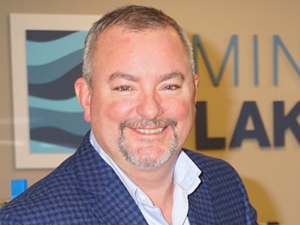
Community bankers played a leading role in delivering Paycheck Protection Program loans during the last 12 months, and Noah Wilcox said he believes banks like his Grand Rapids State Bank and Minnesota Lakes Bank will be increasingly called on to partner with the federal government on crucial stimulus programs.
Wilcox, who is chair and CEO of the two Minnesota banks, concludes his one-year term as chair of the Independent Community Bankers of America as the association hosts a virtual version of its annual convention March 9-10. Wilcox, a fourth-generation banker, turns the chairmanship over to fifth-generation banker Robert Fisher, president and CEO of Tioga State Bank, Spencer, N.Y.
“I have had meetings with my executive staff at both charters and said, ‘I think we need to understand that being conscripted to deploy federal programs to save small businesses or certain segments of the economy is probably part of our future business model and we need to understand that, we need to plan for it. We need to think about what the best approach is’.” Wilcox said that had he known another stimulus law with a key PPP component would pass in December, he would have hired a full-time PPP manager.
Wilcox expects the government will call on community banks in the future if other economic crises emerge. “Now we’ve seen that a program like this works, and in concert with the regulatory community encouraging community bankers to work with their borrowers, to make modifications, deferrals, interest-only periods, things that ordinarily would have been frowned upon, I think they’ve seen that it works and there is a recipe for success in saving jobs, saving businesses and ultimately saving the economy,” he commented.
Despite the pandemic, Wilcox believes community banks have built some momentum with Congress and he hopes it continues, even as the importance of education grows. “The thing to point out with any new Congress, is there is a great deal of education that needs to take place,” Wilcox said. “You need to really educate those new members on what community banks are, what they do for their community, how they help the nation’s economy, how they are the drivers of small business lending that create the significant portion of jobs in the United States. That’s a massive undertaking.
“I think we still have tremendous momentum. I can’t think of a more partisan time in my lifetime than the last several years, yet we were getting things done for community banking on a bipartisan basis,” Wilcox commented. “So I think it underscores that when you can do good things for your community and help the members reach across the aisle to one another, you can get things done for the politics of community banking.”
The pandemic, which cancelled the extensive travel schedule that typically goes along with the chairmanship of a national trade group, has impacted the banking industry, the economy and the business of trade associations in lasting ways, Wilcox said. “The work-from-home genie is out of the bottle,” he said. “I would expect there will be some staff who will express a desire to continue to work from home. ICBA will have to respond to that. There are some leadership meetings — I can see some of that maintaining a virtual format because some of the meetings that we have that are routinely in-person, frankly, turned out to work really well in a virtual environment.”
Wilcox said nearly every aspect of the banking business is being reconsidered in light of the pandemic experience. “What does lobby usage look like? What do lobby hours look like? What kinds of transactions do you really not do in the lobby anymore that you might have before, and try to assess how much of the customer base stays in the digital channel that they migrated to, and how many of them migrate back to a preference for in-lobby experiences? Those are things we are all going to have to contemplate.”
But Wilcox said a lot of work remains to be done, and that community bankers need to continue to advocate in their best interest. “When I was on stage in Orlando last year, one of the things I asked bankers to do was really engage in grass-roots advocacy and not just at the C-suite level, but literally reaching right down to the front line staff and everyone in between, and that is something I would say again now. It is important,” Wilcox concluded. “We can’t expect our neighbors to carry our water. We have to roll up our sleeves and make our voice heard. The more people who want to join that chorus, the more powerful that voice is and the more we can accomplish for community banking.”
Wilcox was the ninth banker from Minnesota to serve as the president or chair of the ICBA. Bob Barsness of Prior Lake State Bank was ICBA Chair in 1999-00, and Pat DuBois was ICBA President in 1966-67. From 1930 through 1943, six Minnesota bankers headed the association.
